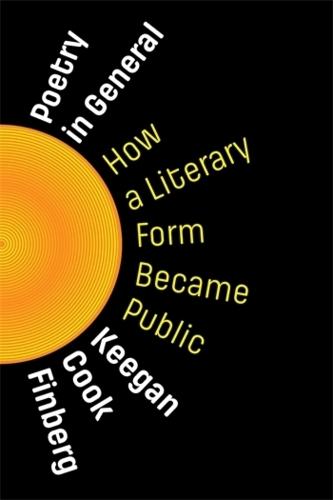Overview
In the second half of the twentieth century, poetry leapt out of books and became an interdisciplinary public form. Poetry entered bureaucratic systems of organization like index card catalogues; it pushed the boundaries of privately owned public parks. Keegan Cook Finberg argues that poetry became an increasingly capacious force during this period because it could speak directly to the degradation of the social-democratic notion of the public. Poetry in General explores how poets expanded their practice into the realms of politics, work, and everyday life from 1960 to the present, from the apex of the welfare state to an era of privatization and austerity. It considers a compelling array of figures-including Yoko Ono, George Brecht, Frank O'Hara, Amiri Baraka, Bernadette Mayer, Eleanor Antin, Adrian Piper, and NourbeSe Philip-whose works draw on conceptual techniques to transform official documents and spaces. Finberg shows how these public texts expose the mechanisms of the neoliberal consensus about work and leisure, the state's facilitation of capitalism, and enduring racial and gender inequities. She also provides politically charged ways to interpret and critique racial capitalism, antiabortion legislation, and mass debt. A new literary and institutional history of postwar poetics, this book shows how poetic experiments address the privatization of collective life and rethink the category of the public.
Full Product Details
Author: Keegan Cook Finberg
Publisher: Columbia University Press
Imprint: Columbia University Press
ISBN: 9780231219211
ISBN 10: 0231219210
Pages: 264
Publication Date: 04 November 2025
Audience:
Professional and scholarly
,
College/higher education
,
Professional & Vocational
,
Postgraduate, Research & Scholarly
Format: Hardback
Publisher's Status: Active
Availability: Awaiting stock

The supplier is currently out of stock of this item. It will be ordered for you and placed on backorder. Once it does come back in stock, we will ship it out for you.
Reviews
Keegan Cook Finberg takes poems seriously enough to see their claims on expanding the very genre of Poetry itself. Recognizing ambitions beyond individual expression, Poetry in General reads poems not as private refuges from social politics but as urgent interlocutors in a world of increasing privatization and politically managed bodies. -- Craig Dworkin, author of <i>Dictionary Poetics: Toward a Radical Lexicography</i> Poetry rarely gets to be general, but Keegan Cook Finberg blasts past misconceptions of marginality, framing it as a vibrant, interdisciplinary, public practice. What a relief to see this truth so clearly stated: poetry—when at its weirdest!—is uniquely positioned to contest the state's facilitation of capital. -- Sarah Dowling, author of <i>Here Is a Figure: Grounding Literary Form</i> What a generous and generative study of contemporary American poetry. This is a serious work of materialist criticism in which ""poetry in general"" is imagined through and with our most important economic and discursive formations, from infrastructure to accumulation to the public sphere itself. Finberg demonstrates throughout an ability to locate in poetry a social archive of our present, and this book will be of interest to all scholars concerned with twenty-first century literary form and philosophical aesthetics. -- Leigh Claire La Berge, author of<i>Wages Against Artwork: Socially Engaged Art and the Claims of Decommodified Labor</i> With Poetry in General, Keegan Cook Finberg advances a notion of the public as a practical fiction enacted in and through social forms that exist not despite the atomized and bureaucratized forms of daily life, but through the extensive paper trails those forms generate. Poetry becomes a way of bearing witness to and living with changing social forms. With wit and verve, Finberg conceptually remaps postwar US poetry. -- Anthony Reed, author of <i>Soundworks: Race, Sound, and Poetry in Production</i>
Keegan Cook Finberg takes poems seriously enough to see their claims on expanding the very genre of Poetry itself. Recognizing ambitions beyond individual expression, Poetry in General reads poems not as private refuges from social politics but as urgent interlocutors in a world of increasing privatization and politically managed bodies. -- Craig Dworkin, author of <i>Dictionary Poetics: Toward a Radical Lexicography</i>
Author Information
Keegan Cook Finberg is an assistant professor of English and affiliated faculty in the Departments of Gender, Women’s, and Sexuality Studies and Language, Literacy, and Culture at University of Maryland, Baltimore County.



